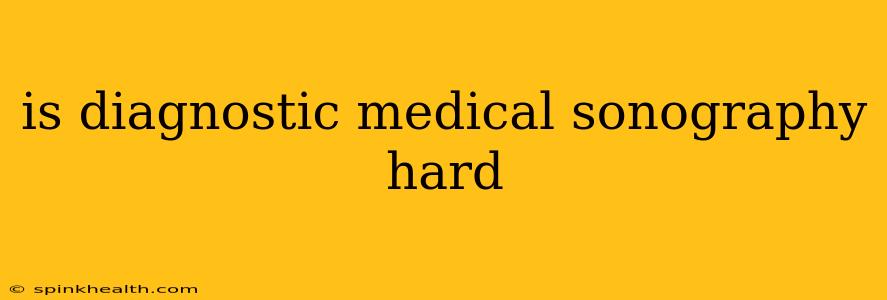Is Diagnostic Medical Sonography Hard? A Journey Through the Program
The question, "Is diagnostic medical sonography hard?" is one I've heard countless times, both as a seasoned sonographer and educator. The short answer is: it's challenging, but incredibly rewarding. It's not just about memorizing anatomy; it’s about developing a keen eye, a steady hand, and a compassionate heart. Think of it like this: it's like learning a new language, mastering a complex instrument, and becoming a detective, all rolled into one.
Let's dive into the specific aspects that make this career path demanding and fulfilling, addressing some common questions along the way.
What Makes Diagnostic Medical Sonography Challenging?
The difficulty lies in the multifaceted nature of the profession. It's not just about pushing buttons; it's a highly skilled profession demanding precision and critical thinking. Here's a breakdown:
-
The Sheer Amount of Anatomy: You'll need to master intricate anatomical knowledge. Knowing the location of organs, vessels, and structures is crucial for accurate imaging. This requires significant memorization and the ability to visualize these structures in three dimensions from a two-dimensional image. It's like learning a complex map, and the map changes slightly depending on the patient's position and body habitus.
-
Developing Fine Motor Skills: Sonography requires extremely precise hand movements to manipulate the transducer and obtain high-quality images. This takes time, practice, and patience. Imagine trying to hold a steady hand while navigating a complex maze—that’s a pretty good analogy for some of the scanning techniques.
-
Critical Thinking and Problem-Solving: Interpreting sonographic images requires analytical skills. You'll need to identify abnormalities, differentiate between various pathologies, and document your findings meticulously. It's not just about seeing an image; it’s about interpreting what it means—a skill developed through years of practice and experience.
-
The Emotional Toll: You'll be working with patients who may be anxious, scared, or in pain. Empathy and communication skills are paramount to put patients at ease and build trust. It is often a privileged position, entrusted with deeply personal and sometimes difficult medical news.
What Aspects of Diagnostic Medical Sonography are Difficult to Master?
Many students find certain aspects of sonography more challenging than others. These commonly include:
-
Abdominal Sonography: Mastering the complex anatomy of the abdomen, identifying subtle changes, and differentiating various pathologies is a considerable challenge for many. The sheer number of structures packed into this area makes accurate imaging and interpretation difficult.
-
Obstetrics and Gynecology Sonography: The rapid changes in fetal development during pregnancy and the nuanced interpretation of fetal anatomy require a high level of skill and precision.
-
Cardiovascular Sonography (Echocardiography): This area requires a deep understanding of cardiac anatomy, physiology, and hemodynamics. The intricate nature of the heart and its vessels demands significant training and practice.
How Long Does it Take to Become a Skilled Sonographer?
The journey to becoming a proficient sonographer is a marathon, not a sprint. It typically involves:
-
Formal Education: An associate's or bachelor's degree in diagnostic medical sonography is required. These programs are rigorous and demanding, involving both classroom instruction and extensive hands-on clinical training.
-
Clinical Experience: After graduation, many sonographers continue to refine their skills through ongoing clinical experience. This hands-on practice is crucial for building expertise and confidence.
-
Continuing Education: The field of sonography is constantly evolving, with new technologies and techniques being developed regularly. Continuing education credits ensure sonographers remain up-to-date with the latest advances.
Is it Worth the Effort?
Despite the challenges, the rewards of a career in diagnostic medical sonography are immense. It's a profession that combines technical skill, intellectual stimulation, and deep human connection. The ability to make a real difference in people's lives is incredibly gratifying. If you have a passion for medicine, a strong work ethic, and a willingness to learn, the journey, while challenging, is undoubtedly worth it.

